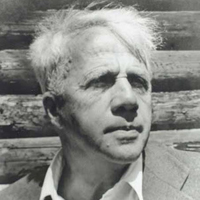The Need of Being Versed in Country Things by Robert Frost: Summary and Analysis
The poem the Need of Being Versed in Country Things appeared in 'New Hampshire' in 1923. It is one of the most characteristic poems of Robert Frost. It expresses his love of Nature and rural things. In this poem "the relative simplicity of the natural" world has been emphasized. Frost deals specially with the contrast between the world of nature and of man-made objects, and in which the essential difference between the two worlds is the relative simplicity of the natural.

Robert Frost (1874-1963)
A house that has burned, leaving only its chimney visible is focused by the speaker. Then it looked the pistil without fresh leaves. The speaker projects a flower image here. All the leaves of the flower have been blown away, but the pistil is still standing there. The pistil is symbolically the remaining chimney. Luckily, the barn was out of the circle of smoke, but it would have joined the atmosphere of the house, now all aflame, had the wind desired so. The wind is given human quality by asserting the human ‘will’ power to the wind. The barn, thus, appeared standing all alone to characterize the place.
The speaker feels sad that the barn is not functioning properly as the horses do not enter and exit from the door. The house did not open with all one end to entertain the teams of cattle that came by the hard road to beat the floor, as though it were a drum, with hoofs moving very fast and also to brush the heat of grain with the summer load. The birds that came to the house through the air flew out of and in broken windows. The birds were murmuring like the sighing or suffering humanity due to concentration on the past events.
The speaker reveals that the house fire occurred sometime age, he states that the lilac brought forth its new leaf for them, and also the old elm tree, though it was charged with fire. For them, the dry tap began sprouting jets of water, and the barrier-post carried a thread of wire. The speaker shows his mature attitude and says that for these birds there was really nothing sad or gloomy in nature. But although the birds felt all happy in nests, one needs being versed in rural things and one should not believe that the phoenix even wept (for no one has even seen or heard them doing so.
The poet has presented facts about Nature in a realistic manner. Since he himself was, for the most part of his life, a farmer living very close to the moods and the vicissitudes of Nature, he knew of her from the close quarters and at first hand. Nature to Frost did not mean what it meant to Alexander Pope, a man of cafes and coffee-houses. Anyone with country sophistication, the poet seems to suggest, will not be deceived by the phoebe's song.
The Need of Being Versed in Country Things is a pastoral poem having little of concrete imagery. Though this is hardly true of Frost's poetry in general, yet the imagery is almost absent in the present poem. This poem is sufficient to prove that Frost did not allow himself to be swept away by emotions in the face of Nature or country things which he loved so deeply.
As regards the style of this poem, it is very simple and unadorned, and there is simplicity of style and diction. But the simple style of the poem should not lead one to believe that it lacks the elements of depth or subtlety. The poem is about a ruined barn, but Frost uses the subject and the occasion to write a poem about the alliance between sensitivity and acceptance, the realistic attitude which is essential to the true countryman. The last stanza, which gives a new hope and a new light to the 'erring' humanity:
For them there was really nothing sad. But though they rejoiced in the nest they kept, One had to be versed in country things Not to believe the phoebes wept.
In "Not to believe the phoebes wept" there is hidden encouragement to mankind, not to take life sadly or pessimistically. Man for joy and consolation need "be versed in country things." Finally, it is a living poem which is deeply rooted in mortal things and deathless emotions. It has an immediate appeal as a clinical documentation of Nature.
The beauty of the poem is in the descriptions of birds and their indifference towards material loss of human beings. The birds do not lose hope in such disasters, rather they take the natural calamities as the natural continuation of their life. In an implicit level, this poem is an ironic a note in the form a paradox. The paradox lies in the human beings’ attachment to the material possessions and their sense of loss, and the animals and nature’s indifference towards the human’s material loss and their sense of continuation of life.
Related Topics
The Silken Tent: Summary and Analysis
The Death of the Hired Man: Summary and Analysis
Neither Out Far nor In Deep: Summary and Analysis
West Running Brook: Summary and Analysis
Stopping by Woods on a Snowy Evening: Analysis
A Considerable Speck: Literary Analysis
A Considerable Speck: Critical Analysis
Mending Wall: Summary and Analysis
Home Burial: Summary and Analysis
After Apple Picking: Summary and Analysis
The Road Not Taken: Summary and Analysis
Fire and Ice: Summary and Analysis
Nothing Gold Can Stay: Summary and Analysis
Acquainted with the Night: Summary and Analysis
The Gift Outright: Summary and Analysis
Reluctance: Summary and Analysis
The Wood Pile: Summary and Analysis
Brown's Descent: Summary and Analysis
 |
bachelorandmaster.com |